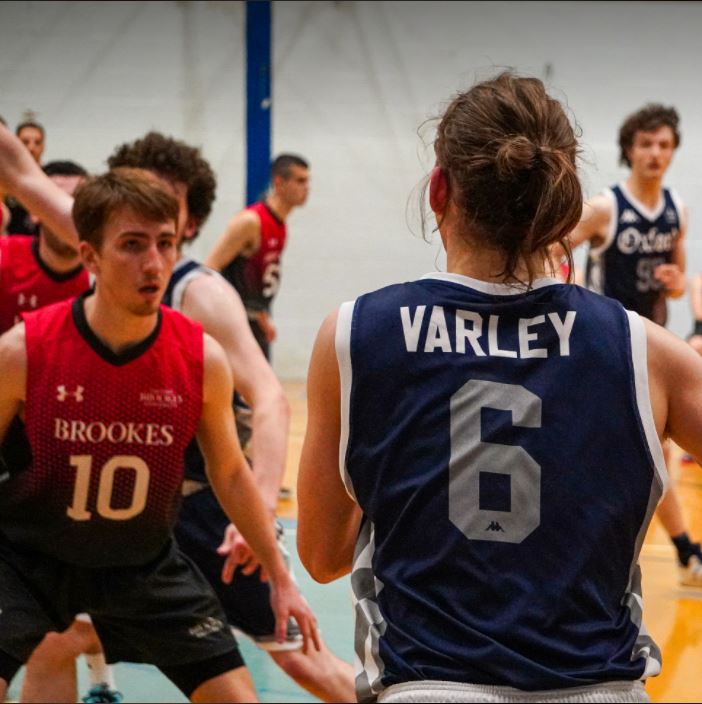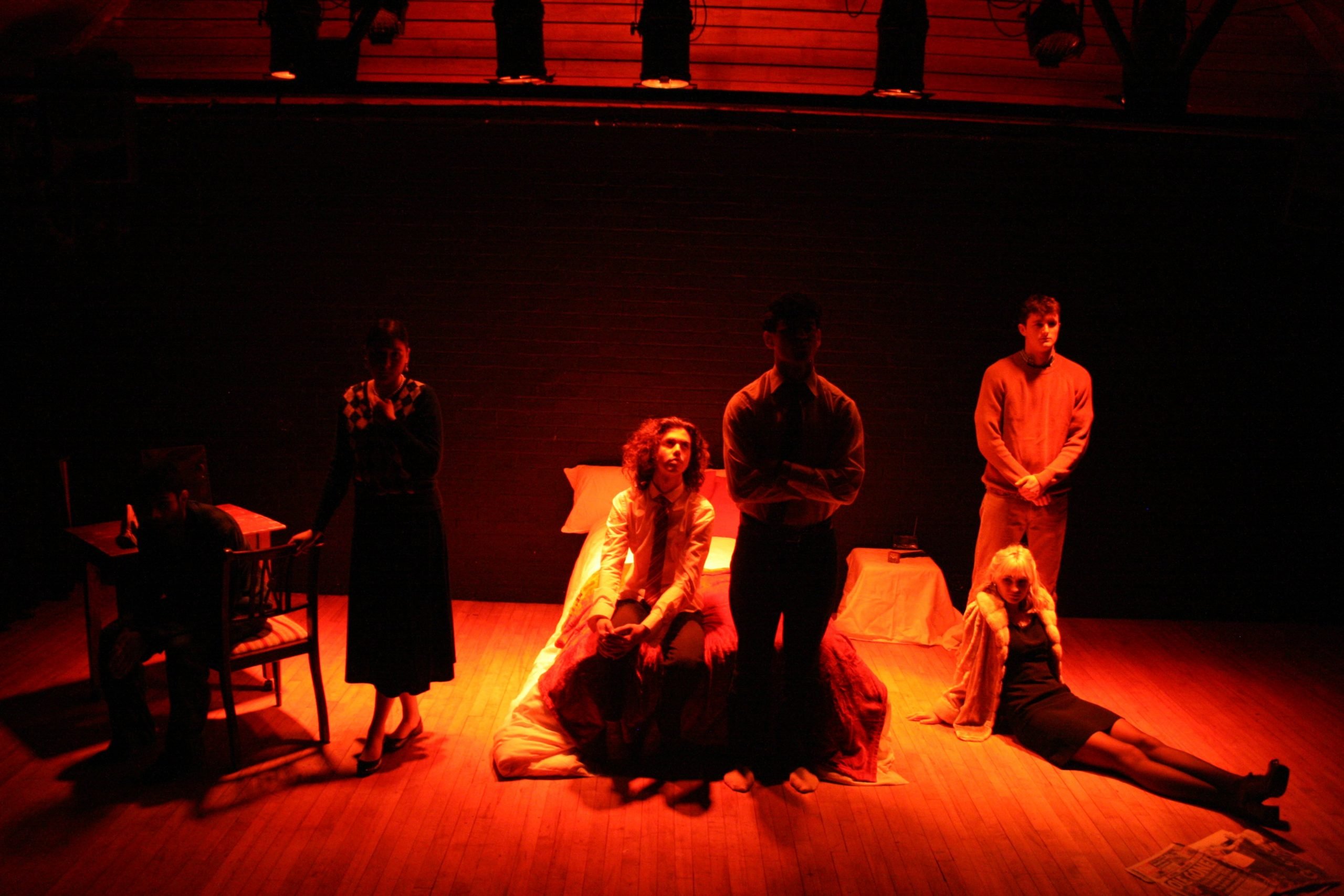Brookes 84-95 Oxford
It’s eight o’clock on a Monday night. The regular crowd shuffles in. We’re in the Oxford Brookes sports centre, and the players are warming up for a relatively important game in their season. Yet I do not care. I worry about the narrative that’s going to play out, and I hope for something interesting enough to commit to paper. But for all the time I’ve spent on this group of people, the tendrils of shared fate have not yet got a grip of me.
Today, I’m looking to change that—partly out of a sense that it’s time enough for it, and partly just because it’s a fun exercise in personal control (or perhaps guided surrender). As the game tips off, I start looking for villains. Roughly, I know my heroes. There’s the trio of Alex, Josh and Orin whom I covered last week, along with the host of other faces I’ve become used to. I don’t know exactly who the protagonists will be this time, but at least I’m clued up on the domain I’m drawing from.
Brookes I know only to an extent. The Blues played them earlier this term in what was a fairly vibrant game. What I had learnt was that their best player is no. 10, Maxwell Adzet Mauchline. The problem with Mr Mauchline is that he’s predominantly unassuming and inoffensive. He just does good things and doesn’t fuss too much about it, which is very unhelpful for my wannabe-zealot self sitting on the sideline. Anyway, Blues players Orin and Akin are tasked with stunting him for this game and, it turns out, they are going to do a pretty good job, so Brookes will be looking elsewhere for leading lights.

Fortunately, the alternative choice is obvious. There is one guy I remember distinctly from the first Brookes encounter: their no. 8, Cole Barton. He has the demeanour of the kind of player that you find annoying whether he’s on your team or the opposition. Either way, he talks too much, protests too much. This is probably unfair, and he could be a great guy. But to enter the mode of true fanhood, you cannot treat people fairly. At least, you cannot treat the opposition fairly. They have to become one-dimensional characters in a two-bit storyline. To that righteous end, with all due apology to the man, I select Cole as my primary nemesis for the evening.
While I’m working this out, the game has been under way, and I look at the scoreboard—it’s lying. ‘Home 15, Visitors 9’. Now, if you’re unfamiliar with the Oxford Blues, what you need to know is that they do not lose. In fact, they don’t ever look like they are losing. That’s how this works. I come and I sit and I enjoy a comfortable display of dominance, and the train chugs on.
But this time, a real game is going on, and Mr Barton (boo) is aiming a shot towards the hoop, and it’s bouncing on the rim, and it’s still bouncing on the rim, and will it ever stop bouncing on this godforsaken rim? I actually thought the ball might have just stopped, there on the rim, but I was wrong. The shot was a miss, and the ball is up the other end, and Josh Soifer scores a two. Nice, some normality.
It’s not really normality because Brookes come back, and I’m noting down more about the opposition players than I have done in any previous match. But now, Orin has earned himself two free throws, and the Brookes crowd is jeering. Free throws normally cast this sudden moment of quiet, but this is not quiet at all. Still, much to the gallery’s disappointment, Orin sinks both. It feels like a moment of proper leadership from the captain. The quarter ends at a balanced 26-25.
For a brief moment there, Brookes were outplaying Oxford—the first time any team has done so this season. Now, though, it’s fairly evenly pitched. The second quarter continues in the same vein, in a reasonably uninteresting way. So instead, I focus my attention on Cole. There’s Cole going for a two in loads of space, but he misses and Akin goes up the other end and shows him how it’s done. There’s Cole going on a big run to loud cheers, but with no end product. There’s Cole going for a big buzzer-beating three, but it’s way off. Turns out this vilification thing is quite fun. The quarter ends with a completely-not-game-changing score of 47-46, but I don’t mind. Take that Cole.
It’s half time. I assess the crowd. It’s larger than the ones we are used to down at Iffley. Or, at least, it has more people unconnected to the team. That is, more people have just come to enjoy the game, with beer and a barely passable grasp of the sport’s rules in hand. The whole sports centre, with its bar, cafe, and screens showing live sports has a communal, welcoming feel that Iffley Road misses. I can’t help but feel it’s a shame that Oxford lack a hub like this.
The third quarter is quite uneventful. Oxford have the slight edge now. As a small lead opens up, the crowd start to ramp up the noise. I feel a little tug of hostility to this. Just tentatively, I am starting to fancy myself as in opposition to those around me. By the end of the quarter, Oxford has built up a lead of 60-68, and I hope all these Brookes fans take note.
Now, the fourth quarter begins. Big Alex three—11-point game. Josh two—13-point game. Strong Alex drive—15-point game. Swerving Harry run—17-point game. I note: “It’s starting, finally, to feel comfortable.” With 6:51 left in the game, the score is 68-84.
The spirit of conquest is broken by a controversy. The Oxford bench is greatly aggravated by something. In basketball, when a player commits five fouls in a game, they are said to have ‘fouled out’ and are not allowed to play any more minutes. The referees have mistakenly miscounted the fouls of Brookes no. 9, Arseniy Pushkin. They say he’s on four. He’s actually on five. But oh well, no biggie.
Pushkin scores a two. Pushkin scores a two. Of course. A big ginger Brookes guy does a great tackle on Josh. The crowd cheers. Pushkin scores a three. This does not stop. In total, Brookes go on a 14-point run. 12 of those points are scored by Pushkin. No biggie.
It’s timeout. The score is 82-84, with four minutes to go. There is a lot of energy pumping around this room right now. As they come out to resume play, Cole riles up the Brookes fans. The referee joins in. Everyone is loving the theatre. We’ve been subjected to a Brookes lead and an Oxford comeback, and now an Oxford lead and a Brookes comeback. Everyone’s had their comeuppance. But somebody has to win this thing. For the first time in the Blues’ season, there is real uncertainty about how this game is going to end. And… I almost care. Almost.
Well, you know the rest, you’ve seen the score. But let me tell it to you. Akin earns two free throws. We’re at the crunch point of the game. The crowd jeers, loudly. They are so ready for him to miss. And he does. He misses both. I feel for him. The game remains in the balance.
But soon enough, Josh scores a two. This is fairly standard procedure. By this point in the game, the term ‘Soifer 2’ has become its own stock phrase in my notes. But this one is special. It relieves some stress, and I’m thankful for it. Yet only a few moments later, I am writing it again. Soifer 2. He runs back into position: “Let’s go!” And again, there he goes, there he goes, there it is. Soifer 2. Oxford are running away with this. And Josh is running away towards the Oxford bench, and he’s jumping and nodding, and everyone’s on their feet. And I’m loving it. Take that Cole. Take that crowd. This is the pinnacle of the Blues’ season so far. It’s a great moment.
In the last minute or so, Akin gets another two free throws. Jeers again. But this time, he does not miss. He swishes both. Each swishing sound is music to my ears. Cole, in resignation, goes for a dunk, and fails, and the buzzer goes. The Oxford squad roars. On a knife edge, their day has been made.
For me, I’m left to ponder my connection to what has happened. Sports fanhood is rationally desired irrationality. It’s the hedonistic paradox—if you try and maximise your happiness, you will not do so. Instead, you have to make yourself invest in something enough that it can cause you pain. To get the most out of it, you have to absurdly surrender yourself to some people out of your control throwing a ball around.
But believe in this idea as much as you want, it cannot, by the nature of its irrationality, be constructed soberly. You have to stare down the barrel of a Brookes victory and feel the oncoming affliction. You need that illegal Pushkin tornado to appreciate the Soifer chest-thumping. As my luck had it, this is what I was able to experience.
And so, I feel ready to say to Brookes that guys, you couldn’t hold us back. You had your little comeback, but eventually the dam broke, and we showed you what’s what. Yes, we. Yes, us. I had won the victory over myself. I loved the Oxford Blues.





